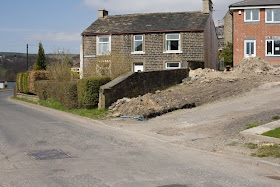I feel sheepish admitting this but it's only recently that I've discovered the oversized section at the
U of O library. And just in time too. I'd nearly exhausted the regular photobook stacks in both library buildings. My normal process had been to browse these in person, not realizing that this method might not catch everything. It wasn't until a random computer search turned up an xTR... title that I realized that there were hundreds of books I hadn't seen yet secreted away on another floor. Silly me, I know.
 Walker Evans' Message: Size Matters
Walker Evans' Message: Size MattersFor the past few weeks it's been a feeding frenzy. I've come home with all sorts of large, awkward treasures: Walker Evans'
Message From the Interior, Callahan's
Water's Edge, Jem Southam's
Landscape Stories, Lisette Model's Aperture monograph, Koudelka's
Chaos, Susan Lipper's
Grapevine, just to name a few. They're all big and gangly. They don't play well with their shelfmates, nor do they fit easily in a pack.
 from Grapevine by Susan Lipper
from Grapevine by Susan LipperNormally I'd find this annoying. I don't think photographs in a book should fight for attention with the format. It's the same reason
very large gallery prints sometimes irk me. But these past few weeks I've learned to love the large books. It turns out that, at least in some cases, size
does matter. The images in David Maisel's
Library of Dust or Eugene Richard's
The Blue Room are almost large enough to fit a gallery wall. A smaller book wouldn't do them justice.
Another book in my oversized pile is Allen Ginsberg
Photographs, a collection of portraits of various beat figures with Ginsberg's handwritten captions. I already own a copy of his
Snapshot Poetics, which covers some of the same territory but at half the scale.
Comparing the two is interesting. The smaller book is more recent and has better print quality, but I like the bigger, older one better. Its photos are grainier and contrastier, and sort of bleached out, more like Tri-X than offset. They look like a bound sheaf of life-sized prints. The photos in
Snapshot Poetics look like what they are: photographs in a book.
 Self Portrait of Allen Ginsberg from Photographs
Self Portrait of Allen Ginsberg from Photographs
In the published version, the flower is burned inSo which is better? That question gets at the root of what a photobook is. Because at its core, a photobook acts a bit like a photograph. It pretends to contain one thing (photographs) but what it really contains are illusions of literal descriptions of that thing (small half-tone translations of photographs). So the question becomes, Do you look at photographs in a photobook to see what photographs look like in a photobook or do you look at them to see how they look as actual photographs? The first way seems more honest, the second way more true to the artist's vision, at least in the case of the Ginsberg book.
Of course my opinion may be biased by my first experience with the book. About halfway through it this beautiful watercolor sprung out of nowhere. It was so colorful in the midst of the black and white pages that I nearly jumped out of my seat.

A one of a kind painting on nice thick paper, no signature, no warning. It definitely would have overpowered a smaller publication. In the large book it was a silent message from the interior.

Someone had tucked it between portraits of Burroughs and Frank, two seers who helped bring culture out of the grey 50s and into the full rainbow of what followed. I don't know if the placement was intentional but it seemed just right.
It sat there staring out at me like a pressed flower, or, rather, an illusion of a literal description of a pressed flower. Not to be mistaken for the real deal.
 Flowers pressed in a book
Flowers pressed in a bookFor that I'd have to turn to one of my alltime favorite small books, Stephen Gill's
Hackney Flowers. The plant parts in that book seem so lifelike you can almost smell them. If I ever find a copy in the library (doubtful) I'm leaving an oversized black and white photo inside.
 from Hackney Flowers by Stephen Gill
from Hackney Flowers by Stephen Gill
 After the opening the fun continues at Barracuda in downtown Portland, where I will be performing as Lil' B, the opening act for my man Twista. This will be my debut as a rapper! So come on out yo and support your homie. If the photo thing don't work out, I think rap could really be my calling.
After the opening the fun continues at Barracuda in downtown Portland, where I will be performing as Lil' B, the opening act for my man Twista. This will be my debut as a rapper! So come on out yo and support your homie. If the photo thing don't work out, I think rap could really be my calling.





















































